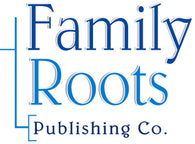

Simple Citations for Genealogical Sources - Bundle of PDF eBook and Paperback
Simple Citations for Genealogical Sources; by Jeffry P. La Marca, Ph.D.; 2024; 161 pp. – 72 in color; Perfect Bound Paperback & PDF eBook bundle ;The eBook is instantly downloadable, with the soft cover book shipping by USPS: ISBN 978-1-62859-359-4 & 978-1-62859-360-0; Item #: FR0162.
This book is also available as a:
PDF eBook: This eBook is instantly Downloadable.
Researching your family history is a fascinating hobby. It often connects you to numerous previously unknown family members and brings history to life! While it is now easier than ever to construct a genealogy, there is one obstacle that can render your research meaningless – the lack of verifiable documentation to support your family tree. Thoroughly documenting your research by always citing your sources is essential and is the gold standard by which your work will be viewed. The intent of Simple Citations is to make that process easy.
Simple Citations:
- Makes citing sources painless,
- Requires minimal me and effort,
- Standardizes the citation on process,
- Eliminates decision-making associated with documentation practices &
- Allows family historians to devote more me to research!
Table of Contents
Dedication
Acknowledgements
Table of Contents
Introduction
Chapter 1: Quick Start Guide
Notes About this Chapter
Three Steps Required to Generate Citations
Getting Started
Chapter 2: Citations
Chapter 3: Other Citation Systems
Chapter 4: The Simple Citations Model
Construction of the Master Template
The Problem with Entering Locations
Required and Optional Fields
Part 1: Master Source
Part II: Source Details
Chapter 5: Syntax Conventions
Punctuation and Syntax:
Parts
Components
Fields and Syntax
Examples for Each Field
Component A: Source Creator (Author, Creator, or Maintainer)
Component C: Source Title or Description
Component D: Publisher Information
Component E: Page Number(s)
Component F: Name of Individual (Person)
Component G: Location of Event
Component H: Census Information
Component J: Repository Information
Component K: Miscellaneous Reference Number
Component L: Personal ID/Catalog Number
Chapter 6: Practical Guide to Using the Templates
Step 1: Which Template Should I Use?
Chapter 7: Using the Census Template
Step 2: Entering Information in Census Template
Field A2a [Primary Creator]
Field A2b [Department or Office]
Field B [Date]
Field C3 [Source Description]
Field C4 [Person(s) of Interest]:
Field D1 [Publisher]
Field D2 [Publisher Location]
Field E [Page Number(s)]
Field F [Person]
Field G [Location]
Field H1 [Census Enumeration District]
Field H2 [Census House ID]
Field J1 [Repository]
Field J2 [URL]
Field J3 [Date File Accessed]
Field K [Miscellaneous Reference Number]
Field L [Personal ID/Catalog Number]
Step 3: Checking Your Census Data Citation: Examples
1870 U.S. Census
1940 U.S. Census
1915 New York State Census
Chapter 8: Using the Traditional Template
Step 2: Entering Information in Traditional Template Fields
Field A1a [Author(s)/Creator(s)/Editor]
Field A1b [Role]
Field B [Date]
Field C1a [Source/Book Title]
Field C1b [Source Subtitle]:
Field C2 [Title (Article, Chapter, etc.)]
Field D1 [Publisher]
Field D2 [Publisher Location]
Field E [Page Number(s)]
Field F [Person]
Field G [Location]
Field J1 [Repository]
Field J2 [URL]
Field J3 [Date File Accessed]
Field K [Miscellaneous Reference Number]
Field L [Personal ID/Catalog Number]
Step 3: Checking Your Traditional Data Citation: Examples
Book – Compiled
City Directory
Newspaper Article – Author Unknown
Newspaper Article – No Identification Information Available
Chapter 9: Using the Non-Traditional Template
Step 2: Entering Information in Non-Traditional Template Fields
Non-Traditional Template: Field A2a [Primary Creator]
Field A2b [Department or Office]
Field B [Date]
Field C3 [Source Description]
Field C4 [Person(s) of Interest]:
Field E [Page Number(s)]
Field F [Person]
Field G [Location]
Field J1 [Repository]
Field J2 [URL]
Field J3 [Date File Accessed]
Field K [Miscellaneous Reference Number]
Field L [Personal ID/Catalog Number]
Step 3: Checking Your Non-Traditional Data Citation: Examples
Certificate of Literacy
Death Certificate
DNA Match - Autosomal DNA
DNA Match – mtDNA
DNA Match – Y-DNA
E-mails
Gravestones
Membership Cards
Passenger List
Will
Appendices
Appendix A: Entering Data into RootsMagic 7 and RootsMagic 9
RootsMagic 5 to RootsMagic 7
RootsMagic 9
Appendix B: Formatting Issues with Software Applications
Entering Names in Family Historian and RootsMagic
Capitalization of Field Entries
Appendix C: Entering Repository Data
Entering Repository Data into Family Historian
Entering Repository Data into RootsMagic
Appendix D: Entering DNA Data
Chromosomes
Autosomal DNA
Citing Autosomal DNA Matches and Common Ancestors
The Sex Chromosomes
Mitochondrial DNA
References
Index
REVIEWS
Simple Citations is a refreshing and very welcome book on genealogy sourcing; I wish I had discovered such a book 25 years ago. When I began researching, I avoided sourcing as a cumbersome exercise with so many opposing and conflicting opinions from other researchers. The author displays a very good understanding of the basic aims of sourcing, therefore simplifying the process. I would recommend this book to anyone wishing to understand how to document their genealogy sources. - Jackson Eagleson, GenealogyReviews.
Simple Citations is long overdue. Like far too many genealogists, I fell into the trap of over-complication. I began researching my ancestry in 1975, nearly a half century ago. At that time, my idea of documentation consisted of photocopying title pages and entries, photographs, and tombstone rubbings. With the advent of electronic applications, I soon became frustrated as I struggled to find stock templates for citing sources. However, I often became frustrated trying to match the information from my documents to the data fields identified in those templates. Dr. La Marca has now developed a simpler way. Rather than working with existing methodology, he has stepped outside of the box and created a new approach; Simple Citations is both easy and understandable. - Dale J. J. Leppard, President and Genealogist of Washingtonburg Chapter, Pennsylvania Society Sons of the American Revolution.
